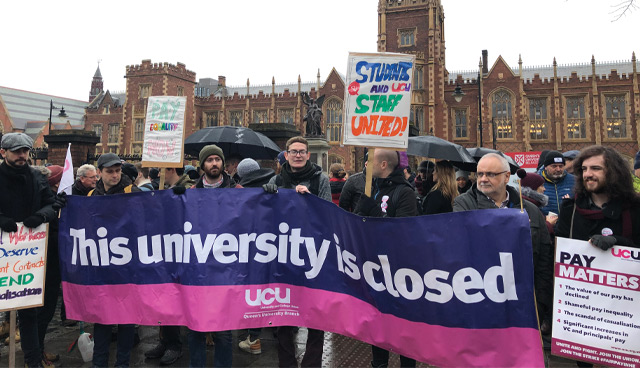Pressure to policy

The recognition of workers’ interests as ‘priorities’ in the New Decade, New Approach deal are the culmination of hard work to place such issues on the political agenda and pressure will remain to ensure that commitments becomes policy, writes the Irish Congress for Trade Union’s (ICTU) John O’Farrell.
For the past two years, the unions across all sectors of Northern Ireland’s economy and society have been engaged in the ‘Better Work Better Lives’ (BWBL) campaign, the specific objectives of which were to address the declining levels of public investment; low pay and insecure work; and end the 1 per cent pay cap afflicting public service workers.
All of these are ‘priority issues’ to be addressed in the Programme for Government as outlined in the New Decade, New Approach deal signed off in January, and apparently a source of wonderment and bewilderment to the brains inside Number 10 Downing Street.
Regardless of which parties placed those issues on the agenda during the long negotiations at Stormont House, it is a fact that those issues were not such a concern to many around that table a few years ago, in particular whomsoever was the occupant of Stormont House.
Back then, during the long period of distain that historians will recall as the ‘Cameron Interregnum’, all of the action was on tax cuts for corporations, paid for by ‘rebalancing the economy’, by trimming the ‘bloated’ public sector, by ending the ‘crowding out’ of those latent entrepreneurs in those cute SMEs, ‘the backbone of our economy’ being stymied by ‘gold plated pensions’ for hospital workers, and morally infected by ‘welfare scroungers’.
I recall being admonished by former Secretary of State Owen Paterson when I asked a room full of boosters for ‘rebalancing’ to at least avoid the dull cliché about slashing corporation tax being a ‘silver bullet’, unless they really believed our economy was akin to a werewolf.
“Not so!”, erupted the Secretary of State, his enthusiasm filling the room like candy floss. “I don’t believe cutting that [corporation tax] is a silver bullet, I really, really think it will be a golden bullet!”. Thus, shifting the metaphor from 19th century myth to 20th century James Bond baddie Francisco Scaramanga.
Thankfully, that time seems to have passed, and now we are in a place where the issues we banged on about for a decade have finally entered the realm of common political sense. While it would be arrogant to insist that the noise we made with some like-minded campaigners (and some politicians from all backgrounds) has been vindicated, it would be too modest to put this as ‘responding to the doorstep’.
This iteration of Stormont will be remembered for the series of unfortunate events that compelled action.
This iteration of Stormont will be remembered for the series of unfortunate events that compelled action. The tipping point was nurses and other health workers on picket lines, demanding decent pay and investment in their workplaces. At the same time there were strikes and actions short of strikes by civil servants, by teachers, principals and their support staff, and by university lecturers.
Unions brought those parties and the two governments to the table and kept them there until they reached a deal, which has at its centre, the reasonable demands of working people who have had enough of a decade of austerity and marginalisation, and require their place too.
The BWBL campaign gained a plurality of support from MLAs for the establishment of a forum for social dialogue in Northern Ireland, which could would deal with some key social and economic issues facing Northern Ireland and which would be formal and at least tripartite (unions, employers and government), plus ideally the community sector and the farmers.
There are a number of supportive provisions in New Decade, New Approach.
- Under the Sustainability of the Institutions heading it states: “The parties also agree to introduce reformed measures to put civic engagement and public consultation at the heart of policy making, recognising the vital role that wider society plays in supporting effective and accountable government.”
- Under the Structured Civic Engagement heading it refers to the setting up of a Compact Civic Advisory Panel recognising that civic society groups have a role in assisting government from time-to-time to resolve complex issues.
- The annex associated with the Programme for Government states: “Engagement with civic society and the principles of co-design and co-production must underpin the development of the Programme for Government, budget and strategies.”
All of these references provide scope and an opportunity for a structured and more purposeful vehicle whereby we can seek to address the interests of workers.
We are also conscious that the agreement answers some other key demands. For example: “The Executive should move to ban zero hours contracts;” and “The new Programme will be aimed at delivering lasting changes and improvements in key priority areas and will include measures aimed at… creating good jobs and protecting workers’ rights.” Further, it states: “The parties agree that access to good jobs, where workers have a voice that provides a level of autonomy, a decent income, security of tenure, satisfying work in the right quantities and decent working conditions, should be integral to public policy given how this contributes to better health and well-being by tackling inequalities, building self-efficacy and combating poverty.”
Unions will seek to ensure that these aspirations become policies and the government honours these definitive and positive policy commitments.





